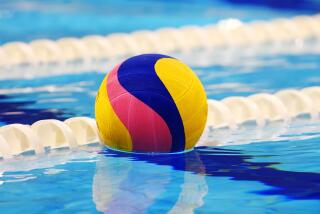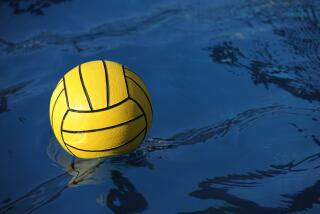Trying to Stay Afloat : Water Polo Programs Lack Funds, Popularity
- Share via
If Mark Polito of Loyola High could nail an outside shot on the basketball court as well as he does in a swimming pool, every Division I collegiate program would be after him. Major shoe companies would seek him out for their summer camps.
But Polito excels in water polo, a sport few of his classmates or people in the community ever come to watch. He wears two pairs of Speedos (the extra one is in case one rips during a game) and a numbered swimming cap that straps under his chin. No shoes. Little potential to make a fashion statement.
Or receive an athletic scholarship--because there are very few.
“There’s no hope for me to play at the college level,” said Polito, who has a 3.85 grade-point average and scored 1,250 on the Scholastic Aptitude Test.
It’s too bad, because Polito and teammate Dave Van Wagner fit that California image of good-looking, muscular teen-age athletes. Unfortunately, their sport does not produce revenue for the schools’ athletic programs and is about as popular as lawn bowling. The number of teams competing at the high school and collegiate levels are dwindling with every budget cut.
“Water polo as a sport died with Prop. 13,” said Hal Harkness, the outgoing City Section athletic commissioner. “There are very few campuses with on-campus swimming pools, and it became too expensive and too cumbersome to transport athletes to off-campus sites.”
In 1980, the Los Angeles Unified School District was forced to cut about $568,000 from its interscholastic athletic programs to make up the shortfall caused by the passing of the 1978 property tax cut initiative. The City Section eliminated badminton and water polo from its sports curriculum.
In 1990, UCLA dropped its water polo program after longtime Coach Bob Horn retired. However, the alumni raised private funds to make the sport self-supporting, and it returned without missing a season. But its existence remains tentative.
Loyola Coach Nick Wooler, 25, who played water polo at Loyola and for one season at UCLA, said that public institutions are always in danger of losing their aquatic programs. “There is a real problem with colleges running teams in the future,” he said. “The fear is that colleges will shut down their programs and it will snowball down into the high schools.”
Loyola, a private Roman Catholic school, traditionally has one of the best water polo programs in Los Angeles County. Wooler said the school will continue to offer the sport as long as there is interest.
Last season, the Cubs finished second to Harvard-Westlake in the Mission League and lost to Newport Harbor, 14-7, in the first round of the Southern Section Division I playoffs. Polito, who led the team with 25 goals, was selected to the Mission League second team. He has 10 goals in the Cubs’ first three games this season.
Polito, who learned how to swim at Friendly Hills Country Club in Whittier, said he hated being in the pool until he joined the water polo team. “I really like competing for the team because of the friends I’ve made and because the sport is so demanding,” Polito said. “You can’t be just an offensive or defensive player.”
In addition to practicing twice a day, Polito has a challenging class load. His winter classes are advanced-placement English, AP Latin, AP computer science, honors pre-calculus, psychology and ceramics. Despite getting as little as four hours’ sleep, Polito rarely misses the 6 a.m. practices.
Van Wagner, who is a two-meter man--the equivalent of a low-post position in basketball--has scored seven goals in three games. He also was selected to the Mission League second team last season. Van Wagner, who has a 3.7 grade-point average and scored a 1,200 on the SAT, said he would like to continue his water polo career at Boston College, but is doubtful.
“One thing about water polo is: You don’t have a bright future,” he said. “You can’t be a prominent high school water polo player and expect it to carry over to the college level.”
While water polo is diminishing as a sport in the Central City, it is booming in Orange and Riverside counties, where new high schools are being built with pools. Rich Corso, who is the U.S. Olympic Team coach and the head coach at Harvard-Westlake, said the sport has been experiencing a renaissance since the 1984 Los Angeles Olympics, when the American team won the silver medal.
“I think water polo is getting stronger and better,” Corso said. “You can’t look at just the Los Angeles area. La Serna (in Whittier) has a strong program, the beach schools have strong programs.
“I think every sport has been affected by budget cuts, not just water polo. If you coach an Olympic sport--and I’m talking about water polo, soccer, team handball--you have to know more than just your X’s and O’s. You have to do everything right, and that includes fund-raising.”
Bell Gardens Coach Robert Greenamyer agrees that the sport is growing, but said the level of talent has dropped considerably.
“There is no continuity to some of these programs,” said Greenamyer, who has been coaching for 18 years, the last 14 at Bell Gardens. “(Walk-on) coaches work for one or two years and then leave for another job. In water polo, you need a coach who will dedicate his time to building a program from the ground up.”
Water polo also struggles in popularity because it shares the fall season with football. Greenamyer blames the California Interscholastic Federation-Southern Section office for not promoting the sport. “They created regional competition by dividing football into 12 divisions. They should have done the same thing with water polo,” Greenamyer said. “We have playoff games as far north as San Luis Obispo and as far south as Indio. That’s a long drive.”
Southern Section Commissioner Stan Thomas said water polo is not treated differently from other sports. “Water polo is just as important as football,” Thomas said. “Obviously, football is a big-money game. But the Southern Section puts on a big show for water polo at Belmont Plaza (in Long Beach), and that’s a big deal. It’s a costly affair, but it’s first-class.”
Rarely does a team outside Orange County win one of the four divisional championships.
Aside from Loyola, Bell Gardens is the only other area school to offer water polo. Although the Lancers have never won a league title, they remain competitive under Greenamyer. They have been to the playoffs eight times and were 1978 Southern Section runners-up to San Marino, which also won the Rio Hondo League title.
“If we had more regional competition, I think we could save the sport,” Greenamyer said. “It would take one guy from CIF to step forward and promote the sport.”
More to Read
Get our high school sports newsletter
Prep Rally is devoted to the SoCal high school sports experience, bringing you scores, stories and a behind-the-scenes look at what makes prep sports so popular.
You may occasionally receive promotional content from the Los Angeles Times.






